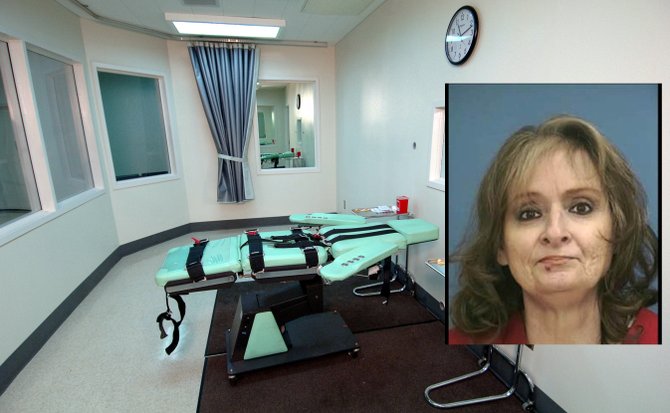Michelle Byrom is asking the court for permission to file another petition for post-conviction relief; the state Supreme Court denied her previous petition for post-conviction.
An Innocent Woman? Michelle Byrom vs. Mississippi
Read Ronni Mott's March 19, 2014, story in the JFP that brought international attention to the tragic case of Michelle Byrom.
JACKSON — In a matter of days, Mississippi may execute a woman for the first time in decades. To make matters worse, that woman may be innocent of the crime for which she has been convicted.
Public-opinion polls regularly show that a majority of Mississippians tend to support the death penalty as an option in heinous murder cases. However, support for the death penalty is based upon the premise that a defendant receives a fair trial and that they are represented by competent attorneys. Michelle Byrom received neither. One of the only certainties in this case is that Michelle Byrom did not receive a fair trial or effective representation by qualified lawyers.
Under Mississippi law, the imposition of the death penalty is reserved for the most egregious cases, where the facts and circumstances surrounding a murder justify imposing the ultimate punishment. As the U.S. Supreme Court has stated, “what becomes harmless error in a case with less at stake may become reversible error when the penalty is death, ... as procedural niceties give way to the search for substantial justice, all because death undeniably is different.”
In this case, everyone agrees that errors were made. Every appellate judge to review the case of Michelle Byrom has agreed that the trial was riddled with errors. The Mississippi Supreme Court stated in its majority opinion, “we have found in this case that during this trial, there were instances of error committed by the trial court.” The dissenters at the Supreme Court agreed, detailing the numerous errors that occurred at trial. The Supreme Court majority looked at these errors and found them to be harmless. However, in death penalty cases no error can be harmless.
I, unlike most judges, know from personal experience what it is like to be wrongfully prosecuted. In 2003 when this case was before the Mississippi Supreme Court, I was facing my own prosecution at the hands of an overzealous prosecutor. Because of my own wrongful prosecution I was not able to add my voice to the record, and I was not allowed to vote to reverse the conviction of Michelle Byrom.
Prior to leaving the Court I had written a dissent in the Byrom case. Justice Chuck McRae adopted that dissent and published it along with his own opinion. However, my vote was not recorded, and I was not allowed to voice my dissent. Today, I would like to join the chorus of other voices speaking out against the unfair trial and conviction of Michelle Byrom.
In 2003 I detailed the many errors that occurred at trial and on appeal in Michelle Byrom’s case. I began by giving an overview of the case.
I agree with the majority’s statement that error occurred in this case. However, I do not agree that these errors should be cast aside as merely harmless. I disagree that such a determination is the moral or ethical thing for us to do. There are some cases where the result just feels wrong. In those particular cases, men, especially those of high character and responsibility, should be guided by their hearts, as well as by the law. In my opinion, this is such a case. The facts of this case and the manner in which the trial was conducted do not support the imposition of the death penalty.
The majority recognizes, as it must, that convictions upon indictments for capital murder and sentences of death must be subjected to heightened scrutiny where all doubts are to be resolved in favor of the accused. It quotes well-established precedent which makes clear that what may be harmless error in a case with less at stake becomes reversible error when the penalty is death. It appears this precedent is quoted simply for appearance sake, however, since the majority ignores it and dismisses numerous errors as harmless. In so doing, the majority errs.
After giving an overview of the case, I began to focus upon the specific errors presented to the Court. In my opinion, I detailed the numerous mistakes and errors committed by the attorneys and the trial judge. However, even a cursory viewing of the record shows that the main problem was that Michelle Byrom’s attorneys committed multiple serious errors. Addressing the issue of ineffective assistance of counsel I stated:
I feel constrained to begin my analysis of the errors in this case by commenting on the derelictions of Byrom’s counsel. Basic trial and appellate responsibilities were neglected or inadequately performed. Necessary objections were not made, appropriate motions were either not made or not zealously pursued, error was not preserved, unwise trial strategy was employed, and the record was not properly developed. Also, the appeal filed on Byrom’s behalf relies in large part on unsupported assertions and vague innuendo and falls below what I consider professionally acceptable. Standing alone, these mistakes might be considered harmless. However, I must conclude, based upon the very specific facts of this case and the heightened scrutiny mandated by precedent, that they combine with other errors to warrant reversal.
After detailing the many errors committed at trial, I turned my attention to the problems on appeal. While the problems during trial were numerous, the problems were exacerbated on appeal. Byrom’s attorneys’ deficient performance continued during the appeal.
As during her trial, Byrom did not receive the zealously advocacy to which she is entitled during her appeal. The brief filed on her behalf was inadequate and the submitted record incomplete. These deficiencies prejudiced her case because we have been unable to completely review the issues presented. With all due respect to Byrom’s counsel, whose intentions were no doubt admirable, the brief that was filed on her behalf falls below what I consider professionally acceptable. The recurring failure of Byrom’s counsel to adequately brief issues is a factor I have considered in concluding that Byrom’s counsels’ performance was deficient. Throughout her brief, Byrom’s counselors have made unsupported allegations and failed to cite relevant authority, or any authority whatsoever in many instances. Error has been claimed, but no prejudice demonstrated, or even alleged in many cases.
Byrom’s brief was roughly half the size of the State’s submitted brief and the written opinion of this Court. After the State filed a well-reasoned response which called into serious question many of the allegations in Byrom’s brief, her attorneys did not even bother to file a reply brief. Though I do not propose to set an appropriate page limit or require that attorneys file a reply brief, I must conclude that, in this particular case, where the defendant’s life is at stake, more should have been done.
Heightened scrutiny is afforded death sentences. Cumulative error will cause harmless errors to be reversible. What may be harmless error becomes reversible error when the penalty is death. These are not hollow phrases with no meaning. They are the standard of our review, and I believe in them. The Mississippi Supreme Court failed to follow this established precedent. Instead, it looked to the evidence of Michelle Byrom’s guilt and decided that errors committed must be harmless. Because of the cumulative errors in this case, the Supreme Court should have reversed the conviction and remanded this case for a new trial.
As a Justice of the Mississippi Supreme Court I have stated many times that “no one is entitled to a perfect trial.” However, everyone is entitled to a fair trial. Michelle Byrom did not receive a fair trial. Michelle Byrom was sentenced to death and the death penalty is different. Its imposition is often arbitrary, and always irrevocable—forever depriving an individual of the opportunity to benefit from new evidence or new laws that might warrant the reversal of a conviction, or the setting aside of a death sentence.
In 2008, in my final opinion as a Supreme Court Justice, I called for the abolition of the death penalty in Mississippi. The case was Doss v. State of Mississippi, and I pointed out that “innocent men can be, and have been, sentenced to die for crimes they did not commit. In 2008 alone, two men convicted of murders in Mississippi in the mid-1990s were exonerated fully. One of these men, Kennedy Brewer, spent an astonishing six years on death row. Just as a cockroach scurrying across a kitchen floor at night invariably proves the presence of thousands unseen, these cases leave little room for doubt that innocent men, at unknown and terrible moments in our history, have gone unexonerated and been sent baselessly to their deaths.”
Many judges have come to the conclusion that the death penalty is unworkable. Justice Harry Blackmun famously stated, “From this day forward, I no longer shall tinker with the machinery of death.” And as I ended my opinion in the Doss case, I stated “I am convinced that the progress of our maturing society is pointed toward a day when our nation and state recognize that, even as murderers commit the most cruel and unusual crime, so too do executioners render cruel and unusual punishment. But because I would make today that day, I dissent.”
Because of the many errors pointed out above, Michelle Byrom’s death sentence should be vacated. And, because of the many problems associated with the death penalty in general, the time has come to end this barbaric practice.
Oliver E. Diaz Jr. served on the Mississippi Supreme Court from 2000 through 2008.










Comments